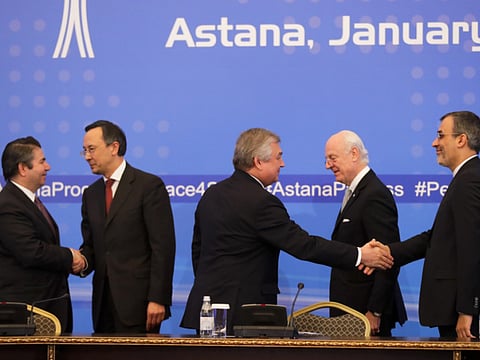Astana talks unlikely to ring in any major change
Backed by Russia, Turkey and Iran, efforts will be made to end the Syrian conflict

Syrian peace talks are expected in the Kazakhstan capital on April 25-26, for the first time since its name was changed from ‘Astana’ to ‘Nur-Sultan’.
The host country itself is going through a historic transition, bracing itself for presidential elections next June, after its founding father Nursultan Nazarbayev, stepped down earlier last month. Kazakhstan’s interim government wants the Syrian talks to pass smoothly, quietly — and successfully — showing the world that it’s business as usual in Astana — or Nursultan — in the post-Nazarbayev era.
This time, however, the Syrian talks may be different. First, they come close on the heels of a stunning defeat in the Turkish municipality elections, shouldered by President Recep Tayyip Erdogan and his Justice and Development Party. That puts Erdogan in a very uncompromising mood, magnified by the near overthrow of the government in Tripoli, and the toppling of Omar Al Bashir in Sudan. This basically leaves Erdogan with two battlefields only: First in Yemen, where the Turkish-backed Islah Party is triggering a tribal uprising against the government of Abdrabbo Mansour Hadi.
In Syria, his proxies are bracing themselves for an offensive on the Kurdish towns of Kobani, Ras Al Ayn and Tel Rifaat, scattered along the Syrian-Turkish border.
Erdogan plans to raise the topic at the next Astana talks, seeking approval from his fellow guarantors Russia and Iran. When Erdogan first voiced the idea last December, neither country objected, eyeing a swap with Turkey: The three Kurdish towns in exchange for re-taking full control of Idlib, Maaret Al Nouman, and Jisr Al Shughour. The Kurdish areas were far more pressing for Erdogan — and dangerous — than Idlib, a city that he knows he cannot keep indefinitely, given that it lies within Russia’s sphere of influence in Syria. Massive refugee crisis
Russian diplomats are not too eager for a military operation in Idlib anymore, at least not at this stage, fearing that it would trigger a massive refugee crisis — into Turkey and beyond — which they would have to answer for before the EU. They are also still undecided on what to do with the Kurdish separatists, in light of United States decision to keep 200 troops in the Syrian northeast.
One option is to give Erdogan a green light to take them on, or to let the Syrian Army do the job, which the Turkish president will not mind. A third is to accommodate them with a political deal, allowing them to keep their light arms, elect their own governor, and establish their own schools, but only after joining the Russian-led reconciliation process. Meaning, a full return under jurisdiction of the Damascus government. Until that is settled, Astana 12 will thus focus on extending the truce both in Idlib and the Kurdish territories. It will give room for the Syrian Democratic Forces (SDF) to jump-start talks with Damascus and for Turkey to fulfil its commitment to the Russians made in Sochi last autumn to fight off Daesh and Hayat Tahrir Al Sham from Idlib.
With little change on the chessboard, Astana 12 will also carry a political angle to it despite the fact that when it first started in 2017 this track was supposed to stick to non-political issues, leaving politics to the United Nations-mandated Geneva process. Russian President Vladimir Putin is seemingly determined to kick-start Syrian constitutional talks at Astana, announcing its final lists which have been under debate for more than a year. The new special representative for Syria, Geir Pedersen, will be present, giving a UN “blessing” to the Astana process.
So will newcomer Arab states such as Lebanon and Iraq, squeezed into the process by the Kremlin. This is a two-way strategy, aimed first at bolstering the Syrian government’s position, since both states are pro-Damascus, but also, at counterbalancing Turkish and Iranian influence in the Astana talks, thereby accommodating Saudi Arabian worries that Syria was drifting into a non-Arab orbit.
Political endgame
The US will attend these talks, which it has treated lightly before, but only as an “observer”, giving Russian statesmen enough space to hammer out a political endgame, tailor-made to Putin’s liking. This may include giving chairmanship of the constitutional committee to a member of the government delegation and agreeing to cross off all names that are vetoed by Damascus. Putin is also using his considerable influence to talk Erdogan into revamping the opposition delegation to Astana, claiming that it is outdated and militarily irrelevant.
Russia’s suggestion is to expand the opposition team, both on the political and military levels, since it currently represents only the Syrian National Coalition. Only four military groups were included in previous talks, the Free Syrian Army, Jaysh Al Islam, Sultan Murad Division, and Faylak Al Sham.
None of these groups is that relevant anymore, having most been evicted from territories that were previously under their control as of mid-2018. Instead of them, or in addition to them, the Russians are advising that Turkey brings the National Liberation Front, Ahrar Al Sham, and the Zinki Brigade to Astana — all being paramount players in Idlib.
Sami Moubayed is a Syrian historian and former Carnegie scholar. He is also the author of Under the Black Flag: At the frontier of the New Jihad.



